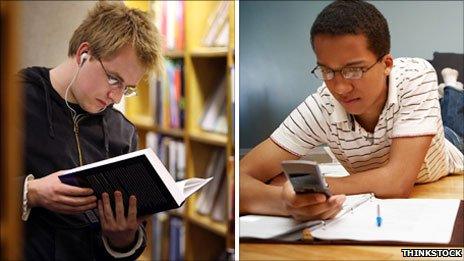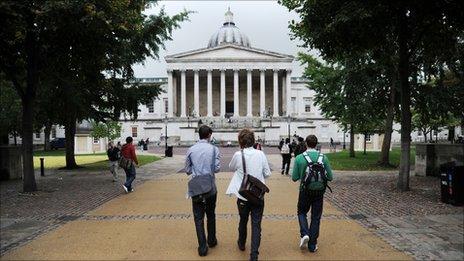What will universities of the future be like?
- Published

From library to smart phone - is this the direction universities will travel?
It's the end of your shift, you dash for the train and switch on your mobile phone as you find yourself a seat.
You log into your degree course learning zone and discover you've been set a tough assignment. You download some key text books from the online university library and begin swotting.
While fellow commuters bury their heads in the Metro, you get some tips from course mates through an online forum.
By the time you reach your stop you have tapped out an essay plan on your smartphone.
Is this the university experience of the future? For an increasing number of students it's happening now.
And with the cost of university set to rise considerably, many more are likely to study for their degrees in cheaper, more flexible ways - perhaps through digitally-based distance learning providers.
'Mortgage-sized debts'
This is the view of the vice-chancellors' body, Universities UK, which warns that as public funding contracts, the traditional residential university experience could become the preserve of an elite.
One of its senior figures, Professor Geoffrey Crossick, argues that the prospect of mortgage-sized debts could force everybody else to find alternative ways in to higher education.
Already more than 80% of England's students work while they study, and about a third of UK undergraduates study part-time - allowing for full-time work.
And an increasing number are seeking more flexible alternatives - with one in 10 UK graduates now on distance learning courses.
One degree and Masters course provider, RDI, which works with a number of UK universities, is positioning itself in this market and has already made the content of some courses wholly accessible via mobile phone.
For a fraction of the cost of a standard residential three-year degree course, students can study a range of subjects through Facebook-type distance learning technology.
RDI chief executive Dr Philip Hallam says today's teenagers are comfortable using this technology for learning.
"And parents of those at traditional universities are beginning to ask 'what are we paying all this money for?' - if their child is getting eight hours of lectures a week and the rest of the time they're going online."
With RDI, the equivalent of a three-year degree course costs between £5,000 and £7,000, and this can be taken and paid for at a pace the student can manage.
Compare this to the £25,000 debt - including tuition and living costs - that this year's freshers can expect to graduate with.
'No substitute'
Dr Hallam says: "It's a couple of hundred pounds a month and most people find that easily affordable and they can work at the same time."
RDI says the student graduates with the same degree as they would get by physically attending the university, but with no debt.
But is the experience they are getting as good?
The University of Birmingham offers a masters course through RDI.
The institution's pro-vice chancellor for teaching and learning, Adrian Randall, says the technology is a huge enabler.
"But it's not a substitute for the real thing," he adds.
Birmingham already has a significant number of students studying from home and it works hard to ensure they feel integrated into university life by providing them with digital networks of their own.

Many believe there is no substitute for a traditional university experience
But surely even the student who lives at home misses out on some of the key university experiences?
Not according to Nikki Brice, who has just completed a distance learning masters course in children's literature from Roehampton University, while working full-time as a lawyer.
She says the level of one-to-one contact was far higher than she had experienced in previous "onsite" post-graduate courses.
RDI's Dr Hallam argues the on campus experience is all about teenagers growing up.
He says: "If you've grown up already then there's not a lot of point in going to that environment and anyway it's an expensive way to grow up."
Professor Rick Rylance, chief executive of the Arts and Humanities Research Council, says there will still be a strong demand for a face-to-face experience, whether that's between students and their teachers or the students themselves.
But he acknowledges what people want from degrees has changed.
'Not affordable'
For many they are no longer a "once in a lifetime passport" to a better life.
He argues that if the participation rate reaches the point where 50% of young people are in higher education, then the game will change in quite a significant way.
The professor, who graduated in 1976, says: "We simply can't afford to give everybody the experience I had."
.jpg)
University education is making increasing use of digital technology
The key issue for him is whether that traditional experience becomes an elite experience.
Prof Rylance says: "I do think that would be a terrible prospect because it would fix social mobility."
If universities become extensions of private boarding schools like Eton then there will not be the same social mixing that occurs at university now, he says.
And the nature of the university experience will "thin out" and degrade for those who still attend, he adds.
The vice-chancellor of Roehampton University, Professor Paul O'Prey, fears if the graduate contribution grows significantly then those with the most to gain from university will be deterred.
Put simply, some people would have to borrow the equivalent of their family's annual income to get themselves a degree.
But there is another side to this elite argument, in terms of what different universities themselves can offer.
Adapt and survive
Prof O'Prey says there are quite a lot of similarities between universities currently, but that this will change if institutions are allowed to charge differing fees.
Soon only those with a "historic brand and reputation" may be able to provide that traditional experience, he says.
"The traditional university model will be available in a much more narrower band of institutions. Outside of that will occur a range of programmes offered in very different ways," he adds.
Roehampton is already making changes to its structure to give its paymasters, the students, a greater say in how it is run.
"We are using modern technologies to consult students on major policy changes and consulting them on budget changes," he adds.
And the university is already embracing a greater range of digital technology and online teaching modules to help regular students as well as those on distance learning courses.
"It's what students want, they want to be able to download that lecture they missed and watch it again online," he says.
Prof Rylance has no doubt that universities will change because they have always experienced turmoil and have never been stable for very long.
Prof O'Prey says things will be different but not necessarily worse for those doing courses in the new ways.
"But as Darwin's theory of evolution found, if you can't adapt you won't survive."